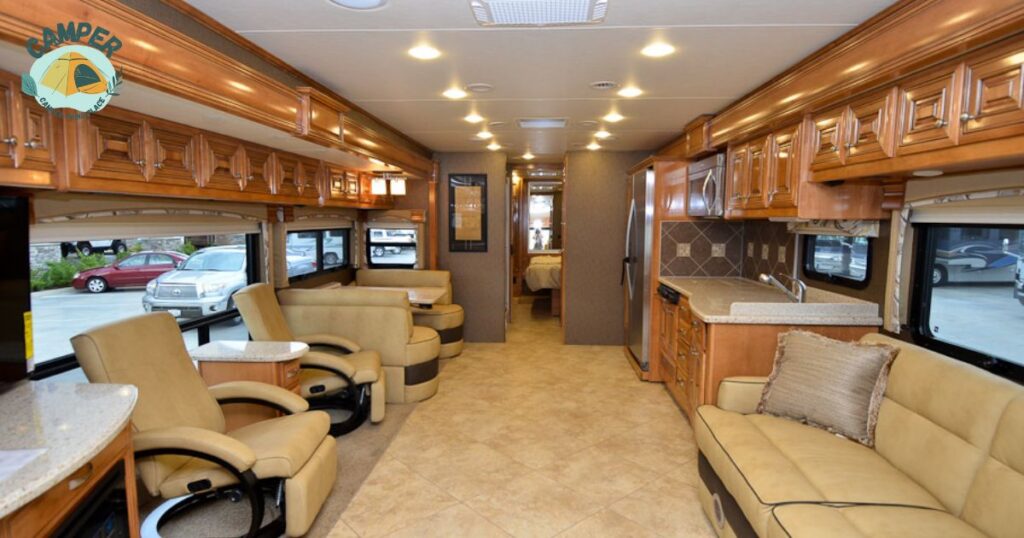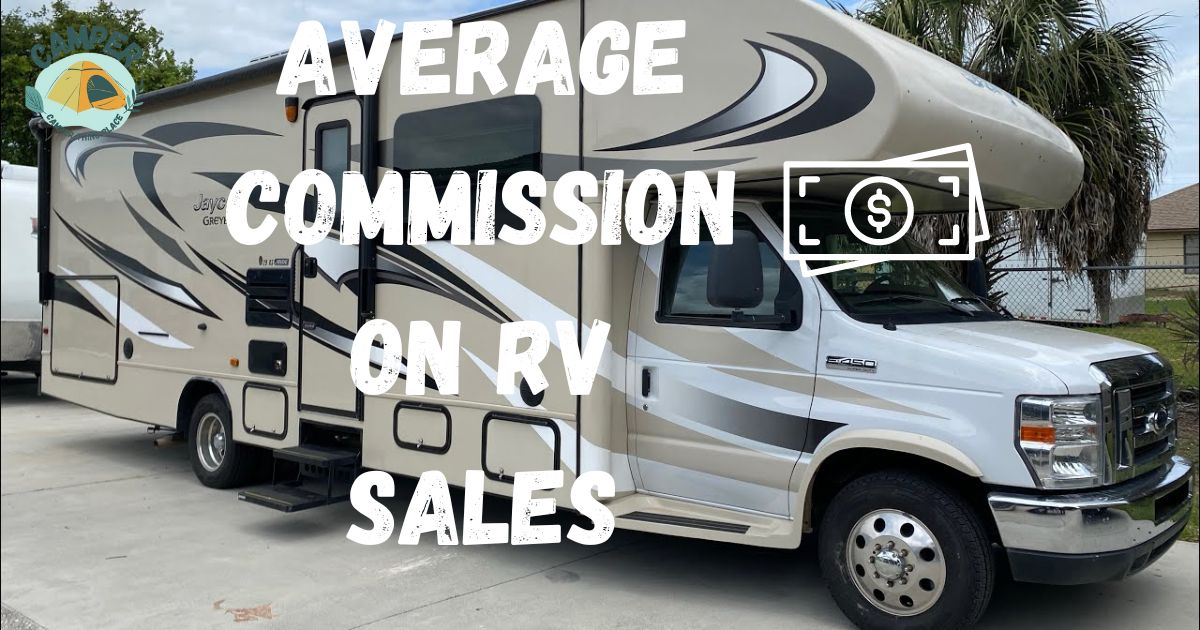The Commission on RV Sales is a regulatory body overseeing recreational vehicle transactions, ensuring fair practices and consumer protection. It works to maintain transparency and ethical standards within the RV sales industry.
The standard commission for RV sales constitutes 20% of the overall net profit derived from the sale. Generally, RV dealerships find themselves left with less than 10% in total profit post-payment of the sales associate’s commission. The overall profit typically falls within the range of 3-10% of the RV sale price.
Several factors influence the commission rate, such as the dealership’s location, the nature of the sale (online or in-person), and the net profit from the RV sale. Our analysis below is based on information collected from trustworthy online sources and local dealerships to present a precise overview of RV sales commissions.
Average Commission On RV Sales
In the realm of RV sales, where determining the value of your RV is paramount, the standard commission rate stands at 20% of the net profit garnered from a sale. Essentially, the compensation for the salesperson is a percentage derived from the retailer’s earnings on the RV sale.
RV prices commonly span between $30,000 and $135,000, with some instances surpassing this range contingent upon the RV type. The gross profit, typically averaging below 10% of the total sale price, forms the basis for commission calculation.
Amidst these considerations, understanding how to determine the value of your RV becomes pivotal in navigating the intricacies of the sales process. After accounting for costs, the commission is then conclusively determined.
It’s important to note that the commission structure for RV sales can vary among companies. Some companies provide higher commission rates to their sales staff, while others may offer lower commissions or present less lucrative RV models to sell.
How Much Does An RV Salesperson Earn?

The compensation structure for RV sales professionals is subject to variation, contingent on the specific RV type and the dealership involved. Generally, however, the remuneration tends to be fairly consistent nationwide.
Sales staff typically earn their income through commissions, which are calculated as a percentage of the sale price. As their sales volume increases, so does their earnings. The salary of a salesperson hinges on factors such as the category of RV they specialize in, their level of experience, and the amount of time they devote to their role.
According to ZipRecruiter data, the average annual salary for an RV salesperson is $57,617. It’s important to note that this figure can escalate rapidly based on alternative reports and the cumulative years of experience a salesperson possesses.
The RV sales industry is characterized by intense competition and relatively low barriers to entry. Ambitious salespersons stand to earn unlimited income by putting in substantial effort.
Salespeople play a pivotal role in the RV sector, ensuring that consumers are well-informed about the diverse range of RVs, their pricing structures, and the features they offer.
It’s worth mentioning that dealerships experiencing higher sales volumes and those situated in fiercely competitive markets may offer lower commission rates to remain attractive to skilled sales professionals.
This emphasizes the dynamic and competitive nature of the industry, where success is often directly tied to effort and market conditions.
What Is The Profit Margin On RV Sales?
The profit margin on RV sales can vary widely depending on several factors, including the type of RV, the dealership’s business model, and market conditions. Profit margins are typically influenced by factors such as the cost of acquiring the RV, operating expenses, and the final selling price.
On average, RV dealerships might aim for a profit margin ranging from 10% to 20%, but this is a general estimate and can vary. Some dealerships may have lower margins on entry-level or mass-produced RVs, relying on higher sales volume to compensate.
On the other hand, luxury or specialty RVs may have higher profit margins due to their premium features and higher price points.
It’s important to note that the RV industry, like many others, operates in a competitive market where dealerships may adjust their pricing strategies based on demand, inventory levels, and other market dynamics.
Additionally, economic conditions and manufacturing costs can impact profit margins. For more precise and up-to-date information, it would be advisable to consult industry reports.
And financial statements of RV dealerships, or speak directly with professionals within the RV sales industry. Keep in mind that profit margins can be dynamic and subject to change based on various market factors.
Factors Influencing Average Commission Rates

Several factors influence average commission rates in the realm of RV sales. One significant factor is the experience of the salesperson. Seasoned professionals with a proven track record often command higher commission percentages, reflecting their expertise and ability to close deals.
The location of the dealership is another crucial determinant. Commission rates may vary based on regional market conditions, competition, and the demand for recreational vehicles in a particular area. High-demand regions may offer higher commissions to attract skilled salespeople.
Dealership policies play a pivotal role as well. Each dealership may have its commission structure, with some offering tiered incentives based on sales volume or bonuses for exceeding targets. Understanding these policies is vital for salespeople seeking to maximize their earnings.
Furthermore, the type of RV being sold can influence commissions. High-end or specialty RVs may come with different commission structures compared to standard models, reflecting the intricacies and potentially longer sales cycles associated with these units.
Lastly, negotiations between the salesperson and the buyer can impact commission rates. The ability to close a deal and navigate negotiations effectively may result in adjustments to the standard commission percentage.
In summary, the average commission rates in RV sales are influenced by factors such as the salesperson’s experience, dealership location, policies, the type of RV, and negotiation skills. A nuanced understanding of these elements is essential for both sales professionals and consumers navigating the RV market.
How To Negotiate For The Best RV Price?

Negotiating for the best RV price requires preparation, patience, and effective communication. Here are some tips to help you negotiate a favorable deal on an RV:
- Research and Know the Market
- Research the make and model of the RV you’re interested in.
- Understand the fair market value for the specific RV by checking online listings, dealership prices, and industry guides.
- Set a Budget
- Determine your budget before entering negotiations.
- Consider additional costs like taxes, fees, and potential upgrades or accessories.
- Inspect the RV:
- Thoroughly inspect the RV’s condition, including mechanical components, appliances, and the overall state of the interior and exterior.
- Note any issues that may affect the value.
- Be Willing to Walk Away:
- Show that you are a serious buyer, but be prepared to walk away if the terms aren’t favorable.
- This can give you leverage and indicate to the seller that you have other options.
- Use Timing to Your Advantage:
- Dealerships may be more motivated to negotiate at the end of a month, quarter, or model year.
- Private sellers may be more flexible if they need to sell quickly.
- Start with a Reasonable Offer:
- Begin negotiations with a fair and realistic offer based on your research.
- Avoid making an extremely lowball offer that may offend the seller.
- Highlight Issues or Concerns:
- Politely point out any issues or concerns you’ve identified during the inspection.
- Use this information to negotiate a lower price or request repairs.
- Bundle Services or Accessories:
- Negotiate for additional services or accessories to be included in the deal, such as extended warranties, maintenance packages, or RV accessories.
- Get Pre-Approved for Financing:
- Having pre-approved financing can strengthen your negotiating position.
- It shows the seller that you are a serious and qualified buyer.
- Negotiate the Out-the-Door Price:
- Focus on negotiating the “out-the-door” price, which includes all taxes, fees, and additional costs.
- This provides a clear picture of the total cost of the RV.
- Be Patient and Respectful:
- Maintain a positive and respectful tone during negotiations.
- Be patient and willing to compromise to reach a mutually beneficial agreement.
Remember that successful negotiation is a two-way street. Both parties should feel satisfied with the final agreement. Be well-prepared, stay focused on your goals, and approach the negotiation process with a positive attitude.
Frequently Asked Questions
What is the average commission rate on RV sales?
The average commission on RV sales typically ranges from 5% to 10% of the total sale price.
Do commission rates for RV sales vary among different dealerships?
Yes, dealerships’ commission rates can vary based on location, dealership policies, and negotiation.
Are there any standard industry guidelines for RV sales commissions?
There are no strict industry standards, but common practice often sees commissions based on a percentage of the sale.
Can RV salespeople earn additional bonuses or incentives on top of their commission?
Yes, many dealerships offer bonuses or incentives based on sales performance in addition to the standard commission.
Do commission rates change for new and used RV sales?
Commission rates may vary, with some dealerships offering different rates for new and used RV sales.
Are there any factors that can influence a higher commission for RV sales?
Factors such as selling higher-priced models, meeting sales targets, and customer satisfaction may contribute to higher commissions.
Do RV salespeople receive a base salary in addition to their commission?
In many cases, RV salespeople earn a base salary along with the commission potential, creating a mixed compensation structure.
Final Thoughts
Understanding the average commission on RV sales is crucial for both buyers and sellers navigating the recreational vehicle market. This commission typically falls within the 5% to 10% range, serving as a motivator for sales professionals.
As you explore RV options, it’s essential to know how the commission structure influences the final cost of the RV. This question prompts consumers to consider the impact of commissions on pricing.
In essence, the average commission on RV sales reflects the industry’s dynamics, rewarding salespersons for their efforts. Buyers should weigh this factor alongside others when making a purchase decision.
Sellers and dealerships must maintain fair and transparent commission structures to foster trust and satisfaction within the RV community.

Jackson Ray, a seasoned blogger with a decade of experience, is the creative mind behind “camperthingsplace.com.” Explore his wealth of insights and passion for camping through engaging content on the website.











